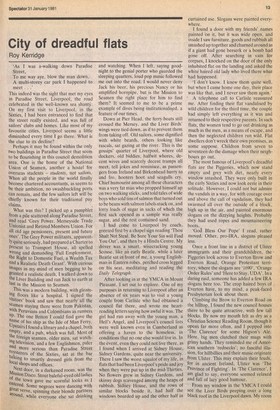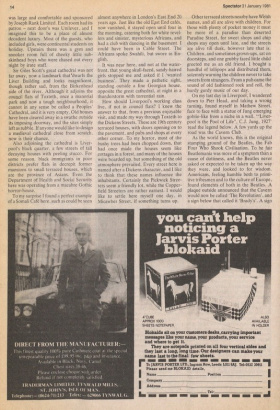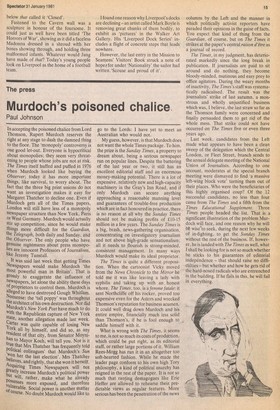City of dreadful flats
Roy Kerridge
'As I was a-walking down Paradise Street, To me way aye, blow the man down, A multi-storey car park I happened to meet „ This indeed was the sight that met my eyes in Paradise Street, Liverpool, the road celebrated in the well-known sea shanty. On my first visit to Liverpool, in the Sixties, I had been entranced to find that the street really existed, and was full of sailors' clubs and homes. Like most of my favourite cities, Liverpool seems a little diminished every time I go there. What is the clue to its 'decline?
Perhaps it may be found within the only two buildings in Paradise Street that seem to be flourishing in this council demolition area. One is the home of the National Union of Seamen, another a hostel for overseas students — students, not sailors. When all the people in the world finally become chartered accountants, as seems to be their ambition, no swashbuckling ports can remain, and the few sailors left will be chiefly known for their traditional pay claims.
What was this? I picked up a pamphlet from a pile scattered along Paradise Street, and read 'Grey Power. Merseyside Trade Unionist and Retired Members Union. For all old age pensioners, present and future ones'. The Grey Power militants, apparently quite seriously, had prepared a Charter to Present to Transport House, all spelled wrong and demanding 'Full Employment, the Right to Domestic Fuel, a Wealth Tax and a Realistic Death Grant'. With curious images in my mind of men begging to be granted a realistic death, I walked down to the Liver Building and ran Jack to earth at last in the Mission to Seamen.
This was a modern building, with gleaming floors like a hospital. I signed the visitors book and saw that nearly all the seamen staying there were from Pakistan, with Peruvians and Colombians as runners UP. The one Briton I could find gave the name of his ship as the Isle of Man Ferry. Upstairs I found a library and a chapel, both empty, and a pub, which was full. Most of the foreign seamen, older men, sat watching television, and a few Englishmen, paler and more serious than Paradise Street r.rIsterers of the Sixties, sat at the bar talking to smartly dressed girls from the local shops and offices. Next door, in a darkened room, was the Mission Disco, Stout baleful-eyed old ladies of the town gave me scornful looks as I entered. Some negroes were dancing with great verve, spinning their blonde partners around, while everyone else sat drinking and watching. When I left, saying goodnight to the genial porter who guarded the sleeping quarters, loud pop music followed me out into the road. I would never deny Jack his beer, his precious Nancy or his amplified hornpipe, but is the Mission to Seamen the right place for him to find them? It seemed to me to be a prime example of dives being institutionalised, a feature of our times.
Down at Pier Head, the ferry lboats still crossed the Mersey, and the Liver Birds' wings were tied down, as if to prevent them from taking off. Old sailors, some dignified with white beards, others looking like rascals, sat gazing at the river. This is the gossips' quarter of Liverpool, where old dockers, old biddies, halfwit whores, decent wives and scarcely decent tramps all meet, tell jokes and reminisce, as passengers from Ireland and Birkenhead hurry to and fro, hooters hoot and seagulls cry. Chief humourist among all these characters was a very fat man who propped himself up on two walking sticks, and told tales of wide boys who sold tins of salmon that turned out to be beans with salmon labels stuck on, and lorry loads of sugar in sacks of which the first sack opened as a sample was really sugar, and the rest contained sand. I had come to Liverpool by coital, greeted first by a chapel sign reading 'Thou Shalt Not Steal. Be Sure Your Sin will Find You Out', and then by a Hindu Centre. My driver was a .smart. wisecracking young Scouse, like an early Beatle, while a later Beatle sat in front of me, a young Englishman in Eastern robes, perched cross legged on his seat, meditating and reading the Daily Telegraph.
After looking in at the YMCA in Mount Pleasant, I set out to explore. One of my purposes in returning to Liverpool after an absence of six years was to visit a young couple from Carlisle who had obtained a council flat there, and wrote me heartrending letters saying how awful it was. The girl had run away with the young man, a Hell's Angel, and Liverpool's council lists were well known even in Cumberland as offering a haven to the homeless, in conditions that no one else would live in. In the event, even they could not live there, as I found when I arrived at Sidney House, Sidney Gardens, quite near the university. There I saw the worst squalor of my life, in flats that had been Liverpool's pride and joy when they were put up in the mid-Thirties. No flowers grew in Sidney Gardens, and skinny dogs scavenged among the heaps of rubbish. Sidney House, and the rows of similar blocks beside it, had half the windows boarded up and the other half in curtained use. Slogans were painted everywhere.
I found a door with my friends' names painted on it, but it was wide open, and inside I saw furniture, goods and rubbish all smashed up together and churned around as if a giant had gone berserk or a bomb had gone off. After searching in vain for corpses, I knocked on the door of the only inhabited flat on the landing and asked the white haired old lady who lived there what had happened.
'1 don't know. I knew them quite well, but when I came home one day, their place was like that, and I never saw them again.' ' A telephone call to Carlisle reassured me. After finding their flat vandalised by wild children for the third time, the couple had simply left everything as it was and returned to their respective parents. In such flats, the women tend to go out drinking as much as the men, as a means of escape, and then the neglected children run wild. Flat dwellers don't wreck their own premises, as some suppose. Children from seven to seventeen do the damage when their neighbours go out.
The most famous of Liverpool's dreadful flats are the Piggeries, which now stand empty and grey with dirt, nearly every window smashed. They were only built in the early Sixties and now look eerie in their solitude. However, I could not but admire the vandals in a way, for with courage over and above the call of vAndalism, they had swarmed all over the outside of a block, high up in the air, and painted enormous slogans on the dizzying heights. Probably they had used ropes and mountaineering boots.
'Goa Bless Our Pope' I read, rather moved. Other, pro-IRA, slogans pleased less.
Once a front line in a district of Ulster immigrants and their grandchildren, the Piggeries look across to Everton Brow and Everton Road, Orange Protestant territory, where the slogans are '1690', 'Orange Order Rules' and 'Here to Stay, UDA'. In a daring raid, someone has added a few IRA slogans here too. The crop haired boys of Everton have, to my mind, a peak-faced Presbyterian look about them.
Climbing the Brow to Everton Road on the hilltop, I found the new council houses there to be quite attractive, with few tall blocks. By now my mouth felt as dry as a Christian Science Reading Room, though it open § far more often, and I popped into 'The Clarence' for some Higson's Ale. Here, big men clutched their mugs with grimy hands. They reminded me of American southern 'rednecks'; no fanciful illusion, for hillbillies and their music originate from Ulster. This may explain their feuds, for in ancient Ireland, Ulster was 'The Province of Fighting'. In 'The Clarence', I am glad to say, everyone seemed relaxed and full of lazy good humour.
From my window in the YMCA I could see the Liver Birds peeping over a long black roof in the Liverpool dawn. My room was large and comfortable and sponsored by Joseph Rank Limited. Each room had its patron — next door's was Unilever, and I imagined this to be a place of almost decadent luxury. Most of the guests, who included girls, were continental students on holiday. Upstairs there was a gym and snooker room full of cheeky little subskinhead boys who were chased out every night by irate staff.
Sir Giles Scott's great cathedral was not far away, now a landmark that 'dwarfs the Liver Building and looks magnificent, though rather sad, from the Birkenhead side of the river. Although it adjoins the council flats of Toxteth, once a manorial park and now a tough neighbourhood, it cannot in any sense be called a Peoples' Cathedral, and it is very empty. Old houses have been cleared away in a swathe outside its imposing doorway, and the sites simply left as rubble. If anyone would like to design a medieval cathedral close from scratch, now is their chance.
Also adjoining the cathedral is Liverpool's black quarter, a few streets of tall decaying houses with peeling stucco. For some reason, black immigrants in poor districts prefer flats in decrepit former mansions to small terraced houses, which are the province of Asians. Even the Department of Health and Social Security here was operating from a macabre Gothic horror-house.
To my surprise I found a perfect example of a Somali Café here, such as could be seen almost anywhere in London's East End 20 years ago. Just like the old East End cafés, now vanished, it stayed open until four in the morning, catering both for white revellers and sinister, mysterious Africans, and had a club with dancing in the basement. I could have been in Cable Street. The Africans spoke Swahili, but swore in English.
It was near here, and not at the waterfront, that young skull-faced, sandy-haired girls stopped me and asked if I 'wanted business'. They made a pathetic sight, standing outside a fine Georgian house, opposite the great cathedral, at night in a thunderstorm with torrential rain.
How should Liverpool's working class live, if not in council flats? I knew the answer to that, from a previous enjoyable visit, and made my way through Toxteth to the Dickens Streets. These are 19th century terraced houses, with doors opening on to the pavement, and pubs and shops at every other corner. To my horror, most of the bushy trees had been chopped down, that had once made the houses seem like cottages in a forest, and many of the houses were boarded up, but something of the old atmosphere prevailed. Every street here is named after a Dickens character, and I like to think that these names influence the inhabitants. Certainly the Pickwick Streeters seem a friendly lot, while the Copperfield Streeters are rather earnest. I would like to settle here myself one day, in Micawber Street, if something turns up. Other terraced streets nearby have Welsh names, and all are alive with children. For those with plenty of pocket money it must be more of a paradise than deserted Paradise Street, for sweet shops and chip shops stay open until late, and the streets are alive till dusk, however late that is.
• Children, and sometimes grown-ups, sat on doorsteps, and one grubby faced little child greeted me as an old friend. I bought a handful of lollipops and distributed them, solemnly warning the children never to take sweets from strangers. From a pub came the sound of old fashioned rock and roll, the hurdy gurdy music of our day.
On my last day in Liverpool, I wandered down to Pier Head, and taking a wrong turnidg, found myself in Mathew Street, face to face with a statue of Jung emerging goblin-like from a niche in a wall. —Liverpool is the Pool of Life", C.J. Jung, 1927' read the legend below. A few yards up the road was the Cavern Club.
As the world knows, this is the original stamping ground of the Beatles, the Fab Four Who Shook Civilisation. To be fair Beatlemania was more of a symptom than a cause of dottiness, and the Beatles never asked or expected to be taken up the way they were, and looked to for wisdom. Americans, feeling humble both to primitive tribesmen and to the culture of Europe, found elements of both in the Beatles. A plaque outside announced that the Cavern would now be called The Revolution', and a sign below that called it 'Brady's'. A sign below that called it 'Closed'.
Fastened to the Cavern wall was a sculpture in honour of the foursome. It could just as well have been titled 'The Horrors of War', showing as it did a faceless Madonna dressed in a shroud with her bones showing through, and holding three malformed infants. Whatever would Jung have made of that? Today's young people look on Liverpool as the home of a football team. I found one reason why Liverpool's docks are declining — an artist called Mark Boyle is removing great chunks of them bodily, to exhibit as 'pictures' in the Walker Art Gallery. His 'Liverpool Dock Series' includes a flight of concrete steps that leads nowhere.
. However, the last entry in the Mission to Seamens' Visitors' Book struck a note of hope(' for under 'Nationality' the sailor had written `Scouse and proud of it'.








































 Previous page
Previous page